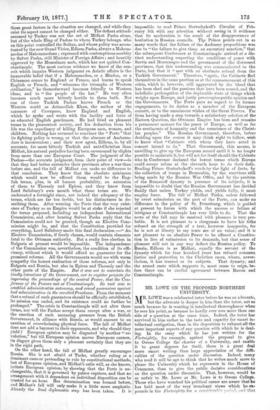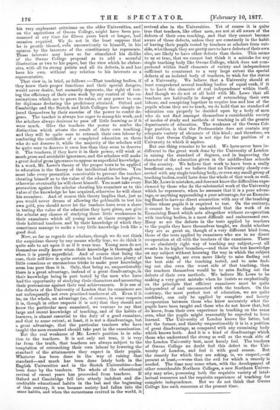MR. LOWE ON THE PROPOSED NORTHERN UNIVERSITY.
.14R. LOWE was a celebrated tutor before he was an advocate, but the advocate is deeper in him than the tutor, not to much because he is wanting in intellectual thoroughness when he sees his point, as because he hardly ever sees more than one side of a question at the same time. Indeed, the tutor has survived in him rather in the taste and capacity for smart in- tellectual castigation, than in the disposition to exhaust all the more important aspects of any question with which he is deal- ing. In the essay which he has just written for the Fortnightly, for example, against the proposal to give to Owens College the charter of a University, and enable it to grant degrees for itself, there is a great deal more smart writing than large appreciation of the diffi- culties of the question under discussion. Indeed, Many who read it will be apt to think that he writes much mote to please the University which he represents in the House of Commons, than to give the public decisive consideratiots on the question under discussion. That, hovtever, would be as unfair to Mr. Lowe as Mr. Lowe is to Owens College. Those who have watched his political career are aware that Ite has held most of the very trenchant viewe which honk-
his very unpleasant criticisms on the older Universities, and on the aspirations of Owens College, might have been pro- nounced at any time for fifteen years back or longer, had occasion required. We do not in the least suppose that he is greatly biassed, even unconsciously to himself, in his opinion by the interests of the constituency he represents. Those interests may have so far stimulated his dislike of the Owens College proposal as to add a scornful illustration or two to his paper, but the view which he elabor- ates, with all its strong points and all its defects, is and has been his own, without any relation to his interests as a representative.
That view is, in brief, as follows :—That teaching bodies, if they knew their proper functions and their special dangers, would never desire, but earnestly deprecate, the right of test- ing the efficiency of their own work by any control of the ex- aminations which are to prove its value, or any power to con- fer diplomas declaring the proficiency attained. Oxford and Cambridge and the Scotch and Irish Colleges have simply in- jured themselves by their exercise of the power to confer de- grees. The teacher is always too eager to scamp his work, and the scholars always desirous to pass off little learning as if it were much. (live the teachers the power to confer the distinction which attests the result of their own teaching, and they will be quite sure to retrench their own labour by conferring the certificate of a completed education on those who do not deserve it, while the majority of the scholars will be quite sure to deserve it even less than they seem to deserve it. The teachers, if they have it in their power, will wink at much gross and avoidable ignorance, and the scholars will make a great deal of gross ignorance to appear as superficial knowledge. In a word, Mr. Lowe's theory of the proper tests to be applied to education is the theory of the intellectual detective. You must take every precaution conceivable to prevent the teacher cheating himself as to the value of the education he has given, otherwise eventually he will cheat himself. You must take every precaution against the scholar cheating his examiner as to the value of the knowledge he has acquired, otherwise he will cheat his examiner. And of course this theory implies that, just as you would never dream of allowing the goldsmith to test his own gold, you should never let the teachers have even a share in testing the value of the education they have given, nor give the scholar any chance of studying those little weaknesses in their examiners which all young men at times recognise in their habitual teachers, and by their knowledge of which they sometimes manage to make a very little knowledge look like a good deal.
Now, so far as regards the scholars, though we do not think the suspicious theory by any means wholly true, we do think it quite safe to act upon it as if it were true. Young men do not themselves really know when their knowledge is thorough and when it is purely superficial. And of course that being the case, their self-love is quite certain to lead them into plenty of little conscious or unconscious tricks to make poor knowledge seem less poor than it is. Only, that being so, unquestionably there is a great advantage, instead of a great disadvantage, in their knowledge being in part tested by the men who have had the opportunity of studying their characters and measuring their pretensions against their real achievements. It is one of the defects of the University of London that its examiners are not unfrequently not even practised teachers at all. Even if it be, on the whole, an advantage (as, of course, in some respects it is, though in other respects it is not) that they should not know the particular men examined, we venture to say that large and recent knowledge of teaching, and of the habits of learners, is almost essential to the duty of a good examiner, and that to some extent, at least, it is not a disadvantage, but a great advantage, that the particular teachers who have taught the men examined should take part in the examination. But the real weakness of Mr. Lowe's position is in rela- tion to the teachers. It is not only not true, it is very far from the truth, that teachers are always subject to the temptation of retrenching their own labour by lowering the standard of the attainments they expect in their pupils. Whatever has been done in the way of raising that standard—and much has been done lately both in the English Universities and in the Scotch Universities—has been done by the teachers. The whole of the educational revival of recent years has proceeded from teachers. If Oxford and Cambridge fell into utterly indolent and dis- creditable educational habits in the last and the beginning of this century, it was because society had fallen into the same habits, and when the earnestness revived in the world, it revived also in the Universities. Yet of course it is quite true that teachers, like other men, are not at all aware of the defects of their own teaching, and that they cannot become aware of those defects, unless they are constantly in the habit of having their pupils tested by teachers or scholars from out- side, who though they are pretty sure to have defects of their own also, are likely to have other defects than theirs. This seems to us so true, that we cannot but think it a mistake for any single teaching body like Owens College, which does not com- prehend within itself elements of variety and independence sufficient to counteract to a very large extent the special defects of an isolated body of teachers, to wish for the status of a University. We believe that a University should at least comprehend several teaching bodies of equal rank, if it is to have the elements of real independence within itself.
And though we do not at all hold with Mr. Lowe that all teachers are habitually in danger of retrenching their own labour, and conspiring together to require less and less of the pupils whom they are to teach, we do hold that no standard of education can properly be decided upon by a body of men who do not find amongst themselves a considerable variety of modes of study and methods of teaching in all the greater departments of education. The weakness of the Owens Col- lege position is that the Professoriate does not contain any adequate variety of elements of this kind ; and therefore, we hold that Owens College is not ripe for the position of a University to which it aspires. But one thing remains to be said. We have never been in- different to the great work done by the University of London in raising the standard of degrees, and in improving the character of the education given in the middle-class schools of the country. We believe that work to have been a really beneficent one, and we believe that no University closely con- nected with any single teaching body, or even any small group of teaching bodies, could have done the whole of that work as well.
But Mr. Lowe is mistaken, and does not know the difficulties expe- rienced by those who do the substantial work of the University which he represents, when he assumes that it is a pure advan- tage, or anything approaching a pure advantage, for an Examin-
ing Board to have no direct connection with any of the teaching bodies whose pupils it is required to test. On the contrary, it cannot be too clearly understood that the work of an Examining Board which acts altogether without co-operation with teaching bodies, is a most difficult and embarrassed one. Many as are the defects in the tests applied by teachers to the pupils they have themselves taught, we doubt whether they are as great as, though of a very different kind from, those of the tests applied by examiners who are in no direct co-operation at all with the teachers of the examinees. There is no absolutely right way of teaching any subject,—at all events in its higher branches,—and those who test knowledge on any subject without knowing the way in which the subject has been taught, are even more likely to miss finding out the best side of the teaching tested, and to miss find- ing out also even the worst side of that teaching, than the teachers themselves would be to miss finding out the defects of their own methods. We believe Mr. Lowe to be making a very great mistake when he insists so emphatically on the principle that efficient examiners must be quite independent of and unconnected with the teachers. On the contrary, the most perfect test of education, we are quite confident, can only be applied by complete and hearty co-operation between those who know accurately what the pupils have been taught and those who do not know that, but do know, from their own experience in teaching on the same area, what the pupils might reasonably be expected to have learned. The University of -London knows the latter, but not the former, and thereby unquestionably it is in a position of great disadvantage, as compared with any examining body which knows both. And it is a kind of disadvantage which those who understand the strong as well as the weak side of the London University best, most keenly feel. The teachers of Owens College no doubt feel this defect in the Uni- versity of London, and feel it with good reason. But the remedy for which they are asking, is, we suspect,—at present at least,—worse than the evil for which a remedy is needed. The time may come when, with the development of other considerable Northern Colleges, a new Northern Univer- sity may arise, possessing both the requisite variety of intel- lectual resources and the requisite experience of teaching for complete independence. But we do not think that Owens College has such resources at the present time.



































 Previous page
Previous page